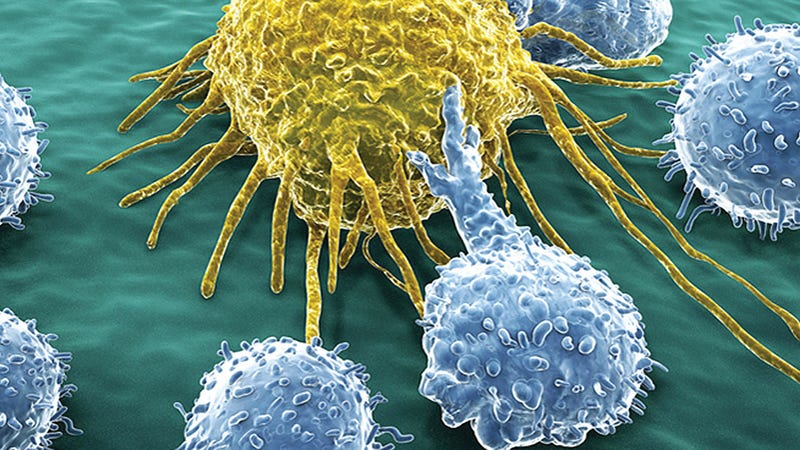
Sean Parker, the billionaire co-founder of Napster and the first president of Facebook, announced a $250 million initiative to accelerate the development of effective cancer treatments—and he’s asking the country’s top scientists to pitch in and openly share their research findings.

The new initiative, called the Parker Institute for Cancer Immunotherapy, will include over 40 research labs and more than 300 researchers from six key cancer centers, including New York’s Memorial Sloan Kettering, Stanford Medicine, the University of California, and others. More are expected to sign on. The institute’s primary focus will be on the emerging field of cancer immunotherapy, in which the body’s immune system is recruited to thwart the growth of cancer cells.
Unlike conventional research efforts, in which hundreds of research labs compete against each other and rarely share their findings, Parker wants contributing scientists to collaborate. In a way, it’ll be like Napster, the music-sharing website he co-founded; the billionaire philanthropist wants his institute to act as a hub from which critical research data is shared. But more importantly, this research won’t just idly rest on the pages of medical journals. Parker wants to see these findings quickly translated to actually therapies.
“Any breakthrough made at one center is immediately available to another center without any kind of IP (intellectual property) entanglements or bureaucracy,” noted Parker in an interview with Reuters.
Parker is frustrated with the slow progress being made in cancer research, and he’s applying his entrepreneurial experience to remedy the problem. The Parker Institute will encourage scientists to borrow from each other’s labs. Home institutions will continue to conduct their own research, but they’ll receive additional funding and access to other resources. Each participating university will have a representative on a centralized scientific screening committee.
Some critics worry that this model will introduce “group think” to cancer research, thwarting innovation and out-of-the-box thinking. In defense, Parker says a central principle behind the institute will be “freedom of innovation in concert with collaboration.” A revenue sharing model will also be put in place to maintain incentive, and as a way to fund future research. Parker himself will take an active role in managing the institute; he says he’s going to be very hands on.
The Parker Institute will have its own central staff of about 50, and will facilitate the patenting of inventions and requisite licensing. It could even launch spin-out companies. One expert described the unconventional model as “academic biopharma.” Though technically not a biotech firm, the institute will drive discoveries towards drug development. In addition to the contributing cancer centers, the effort will include partnerships with patient advocacy groups, as well as over two-dozen private companies, such as Merck, Genentech, and Grail.
The Parker Institute, which will be based in San Francisco, will focus on three key research areas: modifying immune cells to target tumors, boosting patient response to current immunotherapy drugs, and identifying other targets to attack tumors.
Immunotherapy, which many experts believe is the future of cancer therapy, re-trains the body’s immune cells to attack and destroy certain types of cancer. It can be done by stimulating a patient’s immune system to work harder to attack cancer cells, or it can be done by boosting a patient’s immune system with synthetic proteins. Early results have been promising, with some studies showing significant increases in survival rates and disease-free periods. Research has shown that efficacy of immunotherapies are enhanced by upwards of 20 to 30 percent when combined with traditional treatments, such as chemotherapy. Recently, an immunotherapeutic drug called pembrolizumab was credited for the success of Jimmy Carter’s cancer treatment.
It’s a promising idea, but one that will require considerable work—and funding. According to the Parker Institute:
Immunotherapy-related research will receive less than 4% of the National Cancer Institute’s $4.9 billion cancer research budget in 2015, and the pharmaceutical industry’s R&D pipeline remains significantly focused on novel chemo and “targeted” agents.
The new institute is the most ambitious effort to combat a disease since Bill and Melinda Gates announced their effort to tackle malaria. Parker’s interest in cancer—a problem he describes as being inherently “hackable”—was sparked by the death of Laura Ziskin, a film producer and friend who died of breast cancer three years ago.